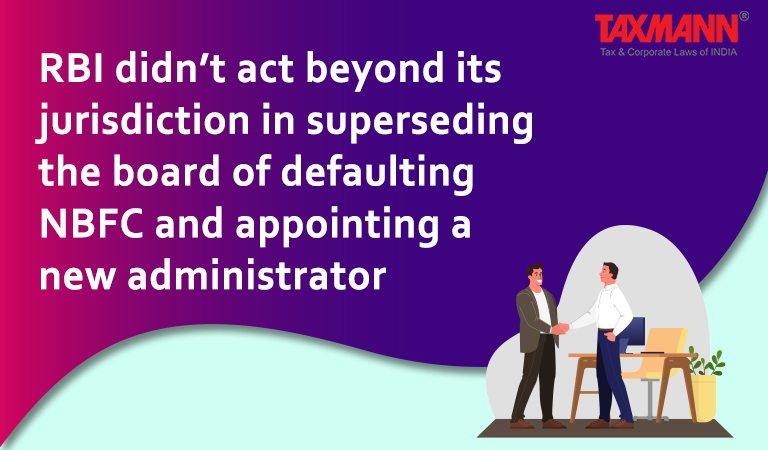RBI didn’t act beyond its jurisdiction in superseding the board of defaulting NBFC and appointing a new administrator
- Blog|News|FEMA & Banking|
- 2 Min Read
- By Taxmann
- |
- Last Updated on 21 December, 2021

Case Details: Adisri Commercial (P.) Ltd. v. Reserve Bank of India - [2021] 133 taxmann.com 181 (Bombay)
Judiciary and Counsel Details
-
- Ujjal Bhuyan and Madhav J. Jamdar, JJ.
- Janak Dwarkadas, Sr. Adv., Ameet Naik, Chirag Kamdar, Abhishek Kale and Deepak Deshmukh for the Petitioner.
- Ravi Kadam, Venkatesh Dhond, Sr. Advs., Rohan Kadam, Prasad Shenoy, Ms. Aditi Phatak, Nilang Desai, Vivek Sheth, Nishant Upadhyay, Ms. Meraja Balkrishnan and Dhaval Vora for the Respondent.
Facts of the Case
In the instant case, SIFL was an NBFC governed by the RBI Act, 1934. SIFL had defaulted in its payment obligations regarding bank borrowings and market borrowings, which revealed serious concerns about the conduct of the company’s affair.
Accordingly, by the impugned order, RBI, in the exercise of powers conferred by section 45-IE, superseded Board of Directors as it was satisfied that in the public interest or to prevent the affairs of an NBFC being conducted in a manner detrimental to the interest of the depositors or creditors or for securing the proper management of such company or for financial stability. So, they appointed an administrator.
Petitioner shareholder of SIFL submitted that the statutory inspection was carried by RBI as far back on 31-3-2020. Therefore, there was no proximate cause for taking such a drastic step as the supersession of the Board of Directors and appointment of an administrator.
High Court Held
On the contrary, the High Court indicated that despite the opportunity granted to rectify governance issues and improve the financial condition, nothing was done. It cannot be said that RBI has acted without jurisdiction or in violation of the principles of natural justice. These are financial, economic, and corporate decision-making matters to handle which statutory bodies like RBI are fully empowered and competent. Accordingly, the High Court dismissed the writ petition.
List of Cases Referred to
-
- Peerless General Finance & Investment Co. Ltd. v. Reserve Bank of India [1992] 2 SCC 343 (para 7.1).
Disclaimer: The content/information published on the website is only for general information of the user and shall not be construed as legal advice. While the Taxmann has exercised reasonable efforts to ensure the veracity of information/content published, Taxmann shall be under no liability in any manner whatsoever for incorrect information, if any.

Taxmann Publications has a dedicated in-house Research & Editorial Team. This team consists of a team of Chartered Accountants, Company Secretaries, and Lawyers. This team works under the guidance and supervision of editor-in-chief Mr Rakesh Bhargava.
The Research and Editorial Team is responsible for developing reliable and accurate content for the readers. The team follows the six-sigma approach to achieve the benchmark of zero error in its publications and research platforms. The team ensures that the following publication guidelines are thoroughly followed while developing the content:
- The statutory material is obtained only from the authorized and reliable sources
- All the latest developments in the judicial and legislative fields are covered
- Prepare the analytical write-ups on current, controversial, and important issues to help the readers to understand the concept and its implications
- Every content published by Taxmann is complete, accurate and lucid
- All evidence-based statements are supported with proper reference to Section, Circular No., Notification No. or citations
- The golden rules of grammar, style and consistency are thoroughly followed
- Font and size that’s easy to read and remain consistent across all imprint and digital publications are applied



 CA | CS | CMA
CA | CS | CMA
